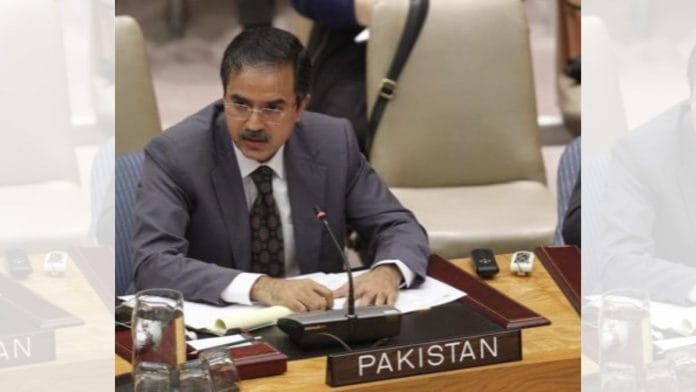New Delhi: Pakistan’s “false flag” theory on the terrorist attack in Jammu and Kashmir’s Pahalgam fell apart at the United Nations Security Council Monday, as the UNSC members chastised Islamabad for its escalatory “nuclear rhetoric”, ThePrint has learnt.
Taking up the issue with the UNSC, Islamabad requested a closed-door meeting, which ended without a clear statement or official resolution.
According to diplomatic sources, the UNSC members quizzed Pakistan on the involvement of Lashkar-e-Taiba in the 22 April Pahalgam terror attack, which left 26 tourists dead.
The sources said that some of the UNSC members, specifically, raised the issue of targeting tourists based on their religion and “expressed concern” over the missile tests conducted by Pakistan, of late.
Pakistan, as a non-permanent member of the Security Council, requested a discussion on the “India-Pakistan question”. Its attempt to take the issue to the UN had also faced pushback from the Security Council members, who had been asking Pakistan to solve the issue bilaterally with India.
Pakistan’s term in the UNSC will finish at the end of 2026. Islamabad has received little international support after the Pahalgam terror attack. On 23 April, a day after the attack, India publicly announced cross-border linkages to the attack. It also imposed punitive measures on Pakistan, including holding the Indus Waters Treaty of 1960 in abeyance.
Islamabad’s permanent representative to the UN, Asim Iftikhar Ahmad, raised the issue of punitive measures at the closed-door meeting, while briefing the UNSC members of “threat of kinetic action” by India against it, said a statement published by Pakistan’s foreign affairs ministry.
The statement from Pakistan added that Ahmed warned the UNSC members that any attempt by India to obstruct or divert the flow of Indus would “constitute an act of war”.
India’s diplomatic measures
New Delhi has imposed several punitive diplomatic measures since the Pahalgam terror attack, including reducing the strength of Pakistan’s High Commission in India to 30 from 55, as well as expelling the three defence advisers and also annulling the position.
India also announced that all Pakistani nationals under various visa categories should leave the country by 1 May this year and closed the Attari border crossing.
Subsequently, India has imposed more restrictions, banning the import of all goods of Pakistani origin, cutting the sending and receiving of parcels, and banning Indian flag-bearing vessels from docking in Pakistan. Also, Pakistani flag-bearing ships will not be allowed to berth at Indian ports.
Islamabad announced its measures on 24 April, saying it “shall exercise” the right to hold all bilateral agreements, including the Simla Agreement, 1972, in abeyance. However, it is, so far, unclear whether Islamabad has issued a notification on this. On 25 April, India officially notified Pakistan of holding the Indus Waters Treaty in abeyance.
The closed-door UNSC meeting came hours after the Secretary-General of the United Nations, António Guterres, made a public statement on the rising tensions between India and Pakistan, urging the two countries to “avoid a military confrontation that could easily spin out of control”.
“Now is the time for maximum restraint and stepping back from the brink. That has been my message in my ongoing outreach to both countries. Make no mistake: A military solution is no solution. And I offer my good offices to both governments in the service of peace,” Guterres said Monday.
The UN Secretary-General has strongly condemned the Pahalgam terror attack and called on bringing to justice the perpetrators through “credible and lawful means.”
On Monday, India’s Ministry of Home Affairs called on several states to hold mock drills on 7 May due to rising tensions with Pakistan. The drills include making the air raid sirens operational and training civilians on the civil defence aspects so they can better protect themselves.
New Delhi has received support from several international leaders, including US President Donald Trump, to find and bring the perpetrators to justice. Islamabad has received diplomatic support from Azerbaijan and Türkiye, with Baku calling for a “transparent international investigation” to resolve the current situation.
(Edited by Madhurita Goswami)
Also Read: TLP chief tells Pakistanis to take up arms against India. People call him rioter & a sell-out






